“Capitalism Concentrates Wealth” Myth Busted
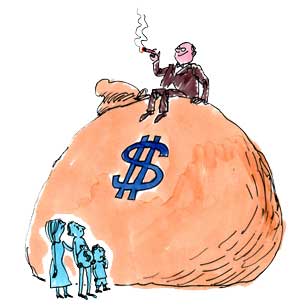



Anarcho-socialists hold a "capitalism concentrates wealth" CCW belief, while anarcho-capitalists hold a "markets undermine privilege" MUP belief. Keeping in mind that no current market has totally free libertarian capitalism, I decided to test the "capitalism concentrates wealth" theory. I used actually existing capitalism as a proxy for capitalism, and the GINI coefficient as a proxy for concentration of wealth.
The measure of capitalism I used was the Frasier Institute Index of Economic Freedom. The IEF ranges from 0 to 10, with 10 being the most capitalist. The highest ranking country was Hong Kong with 8.9, with the US ranking 5th with 8.2. The GINI coefficient was taken from the Wikipedia article List of countries by income equality. The figures from the CIA Fact Book were used when available, otherwise the World Bank's were used. Some countries, such as North Korea and Libya, were not available from either source.
GINI coefficients range from 0 to 1, and are expressed as a percent. A lower GINI number means a more equal society; a higher number means a more unequal society. A GINI of 100% would mean one person owns everything, and everyone else owns nothing. A zero GINI coefficient means that everyone is perfectly equal. Of course, no country comes anywhere close to those extremes. Below 30% is considered very equal, while above 55 or 60 is very unequal. 152 countries were in the sample.
At first I plotted the most capitalist thirty States and the least capitalist thirty States. It was immediately clear that any correlation between capitalism and concentration of wealth would be weak - both capitalist countries and non-capitalist countries were all over the map with respect to equality.
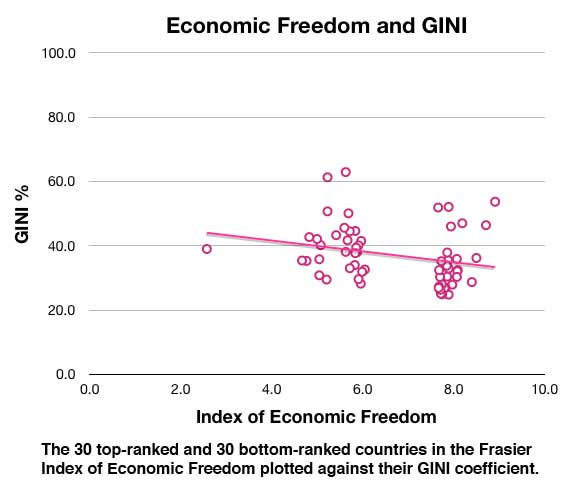

As you can see from the scatter-plot, there seems to be very little relationship between how capitalist a country is and how much inequality there is. The more capitalist States are more equal on the average, but not by much; the average GINI for the most capitalist thirty was 34.2 and the average for the least capitalist thirty was 40.0. Neither the MUP nor CCW theory were strongly upheld.
The Capitalism Concentrates Wealth theory was not supported at all by the evidence.
The trend line would need a positive slope to support the CCW. The slope was negative. The Markets Undermine Privilege theory was weakly supported. There was a -0.2 correlation between the Index of Economic freedom and the GINI coefficient. In other words, capitalism has a distinct but weak correlation with equality, contrary to the CCW theory.
I did notice that many of the poorest and most destitute countries were fairly equal. Poverty may be an equalizer. So I decided to, after entering the rest of the countries, to examine only "developed," or at least non-poverty-stricken countries and see if that made any difference.
Plotting all 152 countries does not change the conclusions. There is a negative slope, meaning that the more capitalist countries tend to be more equal. Capitalism is mildly correlated with equality it seems.
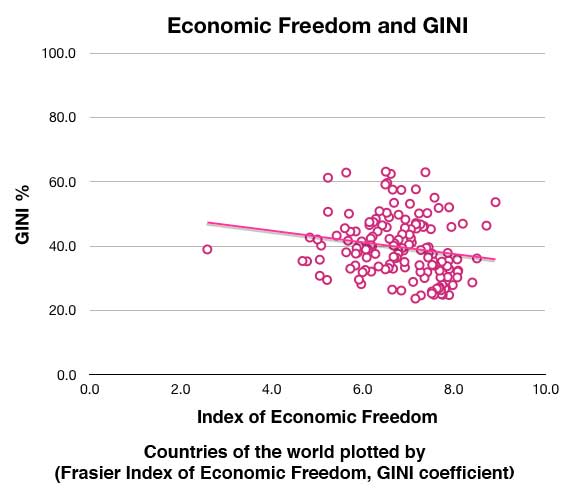

By the way, the outlier on the left is Venezuela. North Korea would have been there, too, if the data had been available.
Anticipating an objection - that poverty-stricken countries should not be included since they are pre-capitalist and pre-socialist - I decided to see what happens if I throw out those countries from the dataset. As a proxy for economic development, I used GDP (PPP) per capita. This is a standard measure for development, just as GINI is a standard measure for wealth concentration. After eliminating all the countries with less than $10,000 GDP per capita, this was the result.
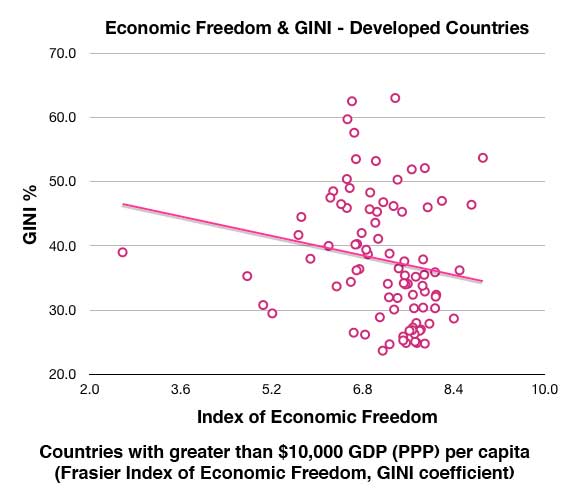

Again we get a negative slope, refuting the CCW but mildly supporting the MUP.
Finally, since my spreadsheet made it so easy to do polynomial fits, I tried a second order (parabolic) trend curve. I wanted to test an 'inverted U' conjecture - that authoritarian anti-capitalist places may have more equality than moderated capitalist areas, but past some "hump," the more capitalist the more equal a society gets. Think North Korea, authoritarian, anti-capitalist, with everyone almost equally piss-poor. If North Korea were to get some capitalist reform and development, it may get more unequal due to new entrepreneurs and production. But then, as it gets more capitalist, it becomes more equal again as people achieve a culture of peace, trust, and exchange.
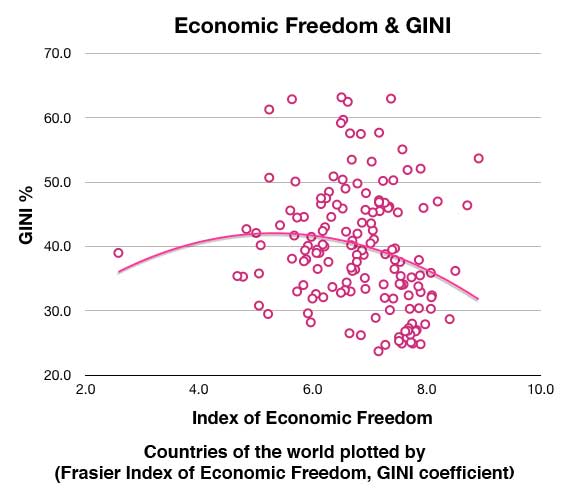

So: My spreadsheet agrees with my inverted U hypothesis. Again it should be pointed out that the correlation is weak, as can be seen by the scatter.
Conclusion: The socialist claim that capitalism concentrates wealth is not supported, using these proxies for the concepts involved. The anarcho-capitalist claim that markets undermine privelege and disperse wealth is supported, but only weakly. It is possible that both theories are wrong, at least in their current one-factor forms. It could be that adding another factor, such as how long since the country suffered warfare or how many peaceful changed of power might greatly effect results.
Here is the spreadsheet with all the data. • Written by Hogeye Bill on 2020-03-08
